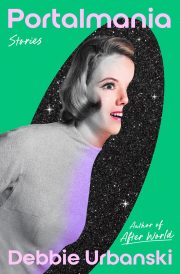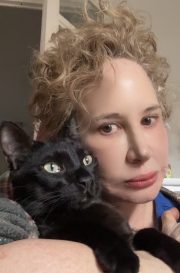Transportation
by Daniel M. Bensen
Trigger warnings: cancer, hospitals
 I had cancer. Don’t worry. I just got the results from my four-year CT scan checkup and I’m fine.
I had cancer. Don’t worry. I just got the results from my four-year CT scan checkup and I’m fine.
I remember, though, when I’d drink coffee and still feel tired. I had stopped doing my podcast, my art. I couldn’t muster the energy to play with my children or go on dates with my wife. Guests would come over and leave while I shivered with a sudden attack of chills. I wondered if I maybe I should give up on writing. It was like lights going dark, one by one.
Let me take you deeper. Sometimes, my gut would clench as if someone had punched me. When I went to a gastroenterologist, she used a stomach probe that felt exactly like what it was: a tiny pair of scissors. That snip my core. And the gastro nasal tube, tugging at my gag reflex every time I moved. I still can’t describe my colonoscopies in any detail or it would ruin my day. I have flashbacks so intense I have to stop and make sure there’s nothing inside me.
Just now, I had to take a break. Look up from my computer. Wiggle my toes in my shoes and rub my thumbs across the tips of my fingers. I’m sitting with my laptop in a mall, not lying on a hospital bed. But for a minute, I felt as if I was. Something in me was convinced my life was in danger. As when I read a good book, I felt gripped. I was transported.
At the beginning, it was like a hole had been punched in the floor. If I wasn’t careful, I’d fall into it. I remember how it felt to have a colostomy bag. I’d feel my gut pressed against my belt and think about the diets I tried before I knew about the tumor blocking my large intestine. I’d drink weak coffee, feel tired. I remember how it felt to be sick, and find myself transported again.
It can be hard to distinguish between thinking about something and experiencing it. When enough sensory switches are flipped, we become convinced at some level that we’re somewhere else. It makes sense why the brain should work this way, of course. If we gave the same weight to thoughts as we did to feelings, we’d be bombarded by a million inconsistent impulses. Assigning priority based on feelings gives us a better chance of learning from our mistakes. In this case, though, there is no lesson. Only a force that drags me out of my life and back into pain.
So I have to get to work with my conscious mind. I have to soothe my limbic system as if it’s a spooked horse. I rub my fingers, I wiggle my toes, I take valerian pills. I imagine my body is being filled with glowing liquid, I compose haikus. Haikus are nice because they force me to count, which is something emotions can’t do, and they help me focus on the beauty in my surroundings. If I can see a mountain gathering a cloak of clouds around her shoulders, why, I must not be in the hospital.
But what about when I was in the hospital? I didn’t need help focusing on my senses then, oh no. My senses were all telling me, quite correctly, that I was in trouble. All those little pinches and tugs from the tubes in me. The crackle of plastic under my blankets. The footboard pressing into my soles. The deep displacement inside me. The fear that I would never recover. That’s when I would read.
That’s why, when I think back to the hospital, I don’t only remember the pinching and wrongness. I remember the way the low-gravity horses ran on air in Karl Schroeder’s Queen of Candesce. Neal Stephenson’s “hideous swarm of giant war-oboes” in The Confusion. Sam Vimes trapped underground, screaming a bed-time story to his son. I got out my kindle and made notes on my manuscript.
Imagine what life would be like if we didn’t get traumatized. Do that, and you’re imagining being unable to imagine. Trauma is how, and why, mere words can carry someone not only into terror but out of it as well. Thank goodness we can do that. Thank goodness we have brains that can be tricked into believing they reside in other skulls.
What good writers do is the reverse of flashing back. We have an idea. We follow a chain of reasoning from that idea to a situation or character. We search for sensory impressions to convey the feeling of being there. Rather than falling into that hole in the floor, we build a trap-door over it. We go spelunking. We find people lying in their uncomfortable hospital beds, unsure if they will ever recover, if they will ever stop hurting, and we pull them out of there.
So here I am, crying in the damn mall as I type this. But at least I can get to the end of this essay. This is like my fourth try in three years. I would start, realize halfway down how deep this hole goes, and fall into it. Now, though, I brought tools with me. Writing tools, you might say, or mental health tools. Tools for building doors over holes, controlling my descent into them, and climbing back out again. Climbing out, God willing, with something that will transport someone who needs it.
•••
Daniel M. Bensen lives in Sofia, Bulgaria, where he teaches English and resides with his daughters, wife, and in-laws in the Balkan Tower of Matriarchy. His work includes the novella Petrolea, the Sidewise Award-winning short story “Treasure Fleet,” and his debut novel, Junction, out now from Flametree Publishing. His website is thekingdomsofevil.com


